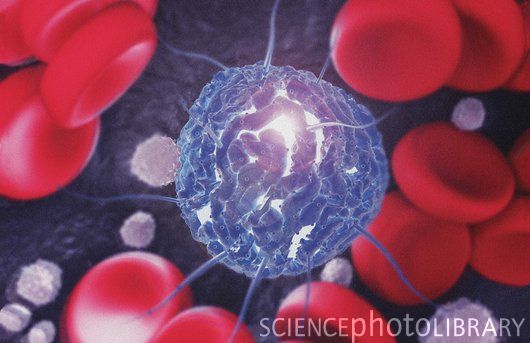据美国物理学家组织网报道,美国科学家首次通过实验证明,可以在活的生物体体内对血液干细胞进行基因修改,让其变成“癌症杀手”——T细胞,使用该方法治疗人类黑色素瘤的治愈率高达40%。研究发表在近日出版的《美国国家科学院院刊》上。

造血干细胞
加州大学洛杉矶分校癌症和干细胞研究中心的科学家在该校医学、微生物学、分子遗传学教授杰罗姆·扎克的领导下,从一位黑色素瘤病患体内提取出T细胞受体(其能找出被黑色素瘤表达的抗原)的基因,并用一个病毒载体将该基因引入人体血液干细胞的细胞核中,对血液干细胞进行了遗传修改。随后,他们将经过遗传修改的血液干细胞置于人的胸腺组织中,并将其移入老鼠体内,以便研究在一个活的生物体内人的免疫系统对黑色素瘤的反应。结果发现,大约6周后,经过遗传修改的血液干细胞发育为大量成熟的能有效对付黑色素瘤的T细胞。
该研究的第一作者、扎克实验室的研究员迪米特里奥斯·凡塔克斯表示,这些基因会同细胞的DNA(脱氧核糖核酸)合为一体并永久并入血液干细胞中,从理论上来说,这意味着这些血液干细胞能在需要时产生无限多的T细胞来对抗黑色素瘤。而且,少许干细胞就能变为一个T细胞“军队”,在黑色素瘤出现时作出反击。
科学家们将两种黑色素瘤移入9只实验老鼠体内:一种能表达可吸引经过遗传修改的T细胞的抗原;另一种则不能表达该抗原。随后,他们观察了肿瘤大小的变化,并使用正电子放射断层造影术(PET)监测了癌症的代谢活动,结果发现,有4只老鼠体内表达抗原的黑色素瘤被完全清除,其它5只老鼠体内表达抗原的黑色素瘤也变小了。
扎克表示,科学家们可以对T细胞进行遗传修改来对抗疾病,但在多数情况下,T细胞的功效并不持久,需要源源不断地提供更多经过遗传修改的T细胞。而最新方法则通过对血液干细胞进行遗传修改来产生T细胞,可以在需要的时候产生大量“新鲜”的抗癌细胞,也有望确保癌症不复发,因此,这种对免疫系统进行遗传修改的方法意义重大。
该研究团队接下来准备进行临床试验以测试这种方法的效果。一个可能的方法是对周边T细胞和能够产生T细胞的血液干细胞同时进行遗传修改,让周边T细胞作为抗癌的“先锋官”,血液干细胞则作为第二波“勇士”,在前线T细胞慢慢失效时,接手进行战斗。扎克也希望这种对免疫系统进行遗传的方法可用于治疗乳腺癌等其他癌症。

Antitumor activity from antigen-specific CD8 T cells generated in vivo from genetically engineered human hematopoietic stem cells
The goal of cancer immunotherapy is the generation of an effective, stable, and self-renewing antitumor T-cell population. One such approach involves the use of high-affinity cancer-specific T-cell receptors in gene-therapy protocols. Here, we present the generation of functional tumor-specific human T cells in vivo from genetically modified human hematopoietic stem cells (hHSC) using a human/mouse chimera model. Transduced hHSC expressing an HLA-A*0201–restricted melanoma-specific T-cell receptor were introduced into humanized mice, resulting in the generation of a sizeable melanoma-specific naïve CD8+ T-cell population. Following tumor challenge, these transgenic CD8+ T cells, in the absence of additional manipulation, limited and cleared human melanoma tumors in vivo. Furthermore, the genetically enhanced T cells underwent proper thymic selection, because we did not observe any responses against non–HLA-matched tumors, and no killing of any kind occurred in the absence of a human thymus. Finally, the transduced hHSC established long-term bone marrow engraftment. These studies present a potential therapeutic approach and an important tool to understand better and to optimize the human immune response to melanoma and, potentially, to other types of cancer.
文献链接:https://www.pnas.org/content/early/2011/11/22/1115050108.abstract








